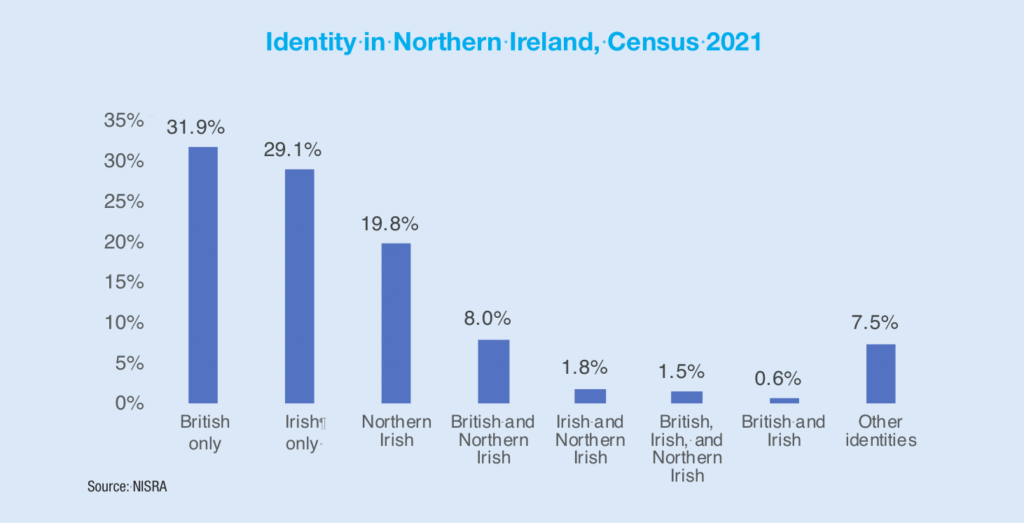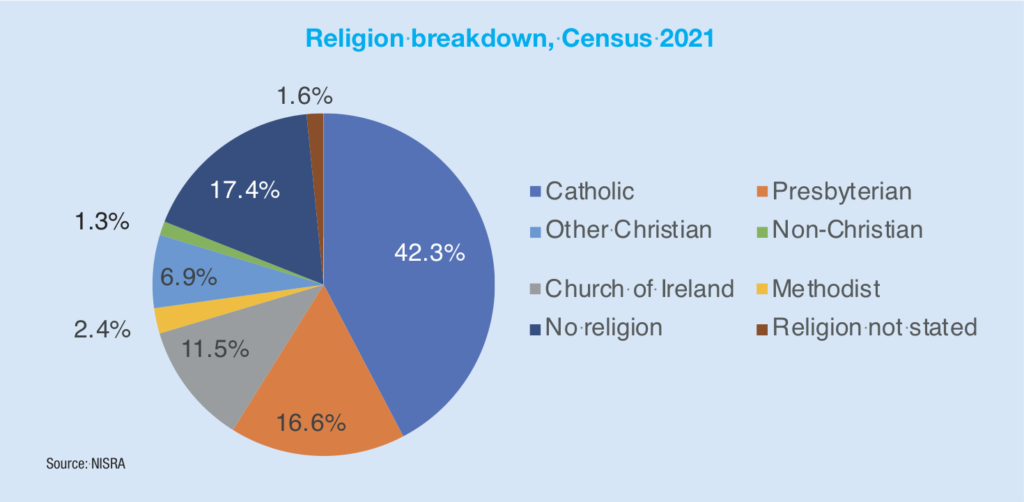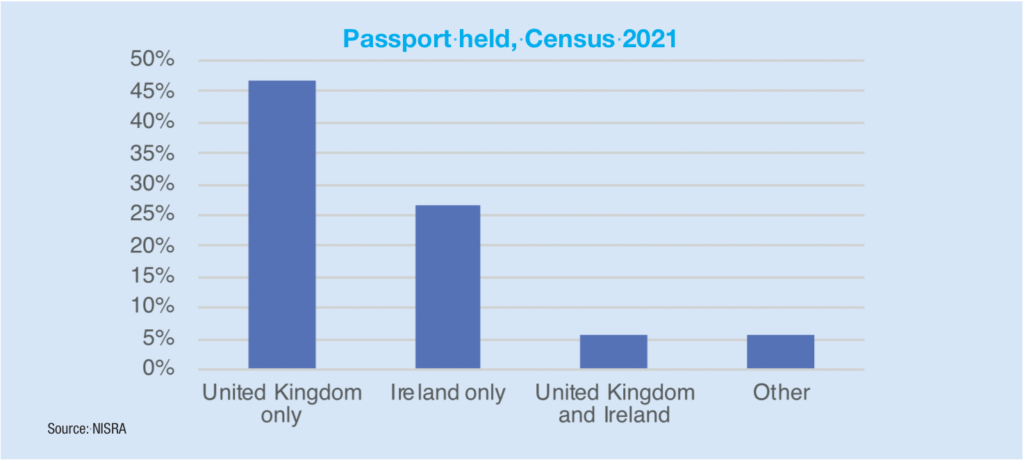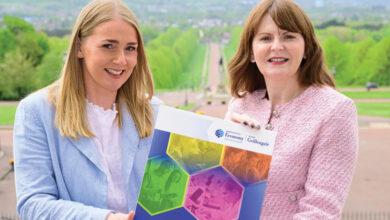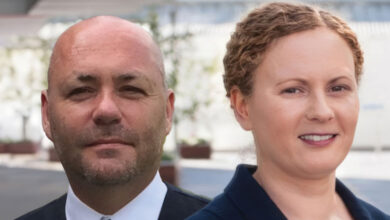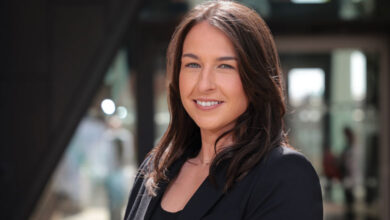Census 2022: Catholic plurality and increasing secularity
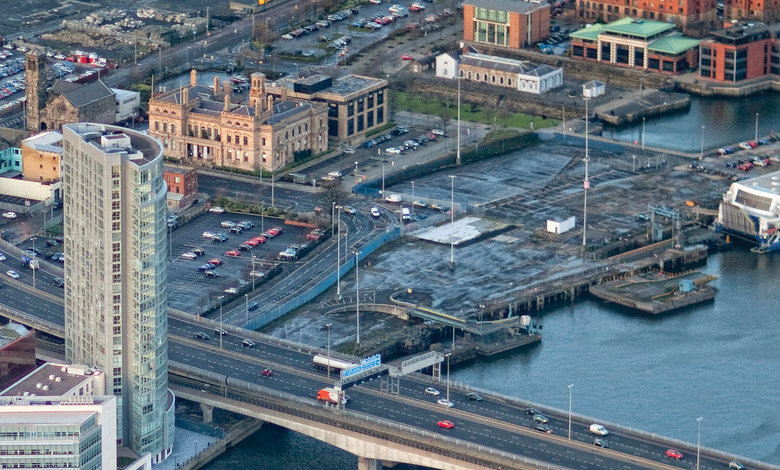
Invented as a state to enshrine Protestantism and Britishness, the Census 2021 results, released in September 2022, have outlined significant change in a century of Northern Ireland.
There were many interesting factors worthy of analysis in the Census results, arguably the most notable of which centre on religious background, national identity, and passports, all of which have recorded notable, even perhaps radical, change since the last census in 2011.
Breakdown by religion
The religion with the largest adherence in Northern Ireland is now Catholicism, with 42.3 per cent describing themselves as Catholic. When Northern Ireland was created in 1921, the Catholic population was outnumbered by Protestants by a factor of two to one, with the very creation of the region, officially classified as a province, rather than a country of the United Kingdom, designed to ensure the precedence of Protestantism in a Protestant parliament for a Protestant people.
It is notable that, rather than a rapid increase in the population of Catholics, there has been a diversification of the population of Northern Ireland, shown by the various Protestant faiths adhered to by the 37.3 per cent of the population who state that they are Protestant, with 16.6 per cent worshiping as Presbyterians, 11.5 per cent in the Church of Ireland, and 2.3 per cent of the population who are Methodists.
Arguably more interesting than the Catholic plurality was the nearly one-in-five (17.4 per cent) of people who state that they have no religion, and fall into varying categories of agnosticism and atheism. 53 per cent of the people who said that they have no religion stated that they were brought up in a religious home.
The figures suggest that there are more people from a Protestant background than a Catholic one who describe themselves as nonreligious, based on the 5 per cent gap between Protestant adherence and ‘Protestant upbringing’, and the 3.4 per cent gap between adherence to Catholicism and having been brought up in a ‘Catholic upbringing’.
Minority religions, including Islam and Judaism, accounted for 1.5 per cent of the population, mostly made up of the 3.4 per cent of people from an ethnic minority background.
These figures outline arguably the biggest demographic change within Northern Ireland, which is that there is an increasing secularity among the population, particularly with younger
generations who further identify as
non-religious.
The population within people of a Protestant background, in particular, is diversifying, becoming less adherent to Protestant faiths than those of an older generation.
National identity
No longer the “secure citadel of unionism”, the BBC’s Peter Taylor once described, less than half (42.8 per cent) of the population of Northern Ireland described themselves as British in any way. Even more surprising was the number of respondents who described themselves as ‘British only’, which was less than one-third (31.9 per cent). This is a decline from a figure of 40 per cent in the last census.
Within the 42.8 per cent of the population who identified as feeling some form of Britishness, 8 per cent of the population identified as both British and Northern Irish. The figure of 42.8 per cent is down from 48.4 per cent who identified as such in the 2011 Census.
What is further notable is that the only age demographic within which a majority identified as British was the 65+ group, thus inferring that the Britishness of the population of Northern Ireland will continue to decline into future generations.
Exactly one-third (33.3 per cent) of the population described themselves as Irish, which is an almost four percentage point increase since the last census in 2011, where 29.4 per cent of the population described themselves as Irish 29.1 per cent describe themselves as Irish only. Also notable is that in Census 2011, Irish was the third-placed identity, behind both British and Northern Irish, whereas now it is the second most popular identity, and is less than two percentage points behind ‘British only’ as an identity.
Noteworthy is that, despite the Catholic plurality in Northern Ireland, that almost one in four of the self-described Catholics in Northern Ireland do not identify as Irish, demonstrating that the two terms Irish and Catholic are not mutually exclusive in Northern Ireland.
The Census furthermore makes clear that a Northern Irish only identity, whilst having a notable place, is losing popularity, with 19.8 per cent of the population describing themselves as ‘Northern Irish only’, which represents a 1.2 per cent decrease in people identifying as such since 2011.
There was, however, an increase in people identifying as Northern Irish when combined with other identities, although it is still behind both ‘British only’ and ‘Irish only’, with 31.5 per cent of the population feeling Northern Irish.
There were 4.5 times more people who identified as both Northern Irish and British compared with those who identified as both Irish and Northern Irish, thus suggesting that the people who identify as Northern Irish come from a background where one would traditionally describe themselves as British.
The prevalence of young people and the identification of themselves as Northern Irish suggests that the bulk of this demographic is made up of young people from British households.
This appears to be down to an increase in people from a unionist background who identify as Northern Irish and less as British, showing that Britishness, whilst continuing to represent the most common identity, is in decline in Northern Ireland.
Brexit increasing Irish passport holders
The Census figures reveal one of the most profound changes, arguably caused by Brexit, to have taken place in Northern Ireland, which is the rapid increase in the number of people who hold an Irish passport, as well as a decline in the number of people holding British passports.
Just over half (52.5 per cent) of the people of Northern Ireland hold a British passport, with 5.9 per cent of the population holding another passport in addition to possessing a British passport. In Census 2011, 59 per cent of the population of Northern Ireland held a British passport, demonstrating a notable decline in British passport holders.
Just over 32 per cent of the population holds an Irish passport, whereas in Census 2011 this figure represented 21 per cent of the population. Whilst the Census does not state when the increase in holders of Irish passports took place, it is hard to look beyond Brexit as having contributed to this increase.
Everyone from Northern Ireland, whether British, Irish, or Northern Irish, is entitled to hold an Irish passport, which furthermore makes them citizens of the European Union, and able to retain the rights to freedom of movement across the European Union to which they are not automatically entitled as citizens of the United Kingdom.
This is a right which has been availed of by many citizens in Northern Ireland. Ian Paisley, the DUP MP for North Antrim who campaigned for Brexit, encouraged his constituents to avail of their rights and said that “If you are entitled to a second passport then take one,” describing an Irish passport as “a very convenient thing to have” for those travelling internationally.
A notable 5.5 per cent of the population of Northern Ireland hold both British and Irish passports, according to the Census.
Additionally, more than 15 per cent of the population hold no passport.
Just under 5 per cent of the population hold passports which are neither British or Irish, a further signal of the increasing secularity and diversity among the population of Northern Ireland.

